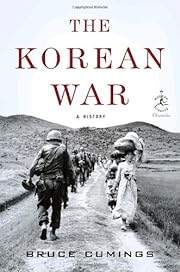

Click on a thumbnail to go to Google Books.
|
Loading... The Korean War : a history (edition 2010)by Bruce Cumings
Work InformationThe Korean War: A History (Modern Library Chronicles) by Bruce Cumings
 None No current Talk conversations about this book.   ) )“The same kind of inquiry is needed into American massacres such as Nogun-ri, the unrelenting firebombing of the North, and one of the most astonishing cover-ups in postwar U.S. history, the black-and-white reversal of the truth of what happened in Taejon.”(Cumings page 174) Cumings details many aspects of the Korean War, including: Nations involved (Korea, China, Japan, Russia, US, Britain) Firebombings and massacres US napalm use Peasant uprisings Infrastructure bombings Political motivations Perspectives of many differing points of view, and how they interacted Firsthand testimonies I learned how the Korean War marked the beginning of the building of permanent US bases in foreign nations. These foreign occupations are what US is, and deserves all the attention Cumings gave. This short book is hard to evaluate because it contains a lot of inside baseball/score-settling with other historians, which only serves to reinforce the author’s point that Americans know virtually nothing about the Korean War, generally misperceiving it as being about the Cold War when it was and remains primarily a civil war and the outside country of most importance is probably Japan, whose occupation set the stage for rebellion against former collaborators (who made up a big chunk of the political class of South Korea until very recently). Cumings emphasizes the atrocities committed by South Koreans and occasionally Americans, while acknowledging that North Koreans also did plenty of harm which has yet to be exposed via a truth and reconciliation commission as in the South. There are meditations on the nature of history and memory that strive for poetry, but don’t quite get there; still, I did learn something about the intractability of the conflict and the ridiculousness of seeing Korea as simply a stage on which the West-Communist Bloc struggle played out. no reviews | add a review
Belongs to Publisher Series
As Cumings eloquently explains, for the Asian world the Korean War was a generations-long fight filled with untold stories of bloody insurgencies and rebellions, massacres and atrocities. He incisively ties America's current foreign policy back to this remarkably violent war that killed as many as four million Koreans, two thirds of whom were civilians. No library descriptions found. |
Current DiscussionsNonePopular covers
 Google Books — Loading... Google Books — Loading...GenresMelvil Decimal System (DDC)951.904History & geography History of Asia China and adjacent areas Korean PeninsulaLC ClassificationRatingAverage: (3.86) (3.86)
Is this you?Become a LibraryThing Author. |
||||||||||||||||||||||||||||||||||||||||||||||||||||||||||||||||||||||||||||||||||||||||||||||||||||||||||||||||||||||||||||||||||||||